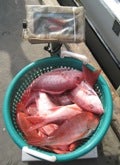 The National Oceanic and Atmospheric Administration’s (NOAA) new catch share policy, which encourages the use of catch shares to manage fisheries, is exciting news for the Gulf of Mexico’s declining fisheries and struggling fishermen.
The National Oceanic and Atmospheric Administration’s (NOAA) new catch share policy, which encourages the use of catch shares to manage fisheries, is exciting news for the Gulf of Mexico’s declining fisheries and struggling fishermen.
The Gulf of Mexico Fishery Management Council deserves a pat on the back for already considering catch shares for some of its fisheries, and NOAA’s new policy can help jumpstart even more progress to end overfishing in all Gulf fisheries. Ending overfishing is good for Gulf economies and will give fishermen more time on the water.
The red snapper individual fishing quota (IFQ), one type of catch share, is wrapping up its third year, and we continue to see the tangible benefits of catch shares: commercial overfishing is ending, fishing businesses are more stable, and bycatch (accidentally-caught fish that must be thrown back in the water and often die) has been significantly reduced.
Other Gulf fisheries and sectors can benefit from catch shares too:
- Grouper and tilefish commercial fishermen want the same benefits that red snapper fishermen are having with their 3-year old IFQ, and they’ll get them when grouper and tilefish are added to the IFQ program in less than a month – on January 1. By extending the IFQ to all reef fish, the economic and environmental benefits could multiply throughout the entire region.
- The Gulf red snapper stock assessment was updated last week and it shows that snapper stocks are rebounding. Though the population isn’t fully rebuilt, additional fish will likely be given to fishing sectors that consistently stay within their annual fishing limits. Commercial fishermen consistently stay within their fishing limits and will likely be allotted more fish for next year. Recreational fishermen, subject to outdated management like short seasons and closures, have exceeded their limit for several years in a row, which could prevent them from receiving more fish.
- Recreational fishermen had one of the shortest red snapper seasons on record this year and had their Amberjack fishery closed unexpectedly in October, all based on efforts from fishery managers to end overfishing. Instead of instituting season closures and other outdated management tools, which are bad for local businesses that depend on tourism, fishery managers should explore other types of management tools – including IFQs for charter and head boats and harvest tags for private anglers. New management like this would give anglers and local businesses more fishing time and continue to rebuild fish stocks.
As you can see, there’s a lot of room for the fishery managers, fishermen and others to capitalize on this opportunity to more quickly an easily implement catch shares. Let’s get to work!









